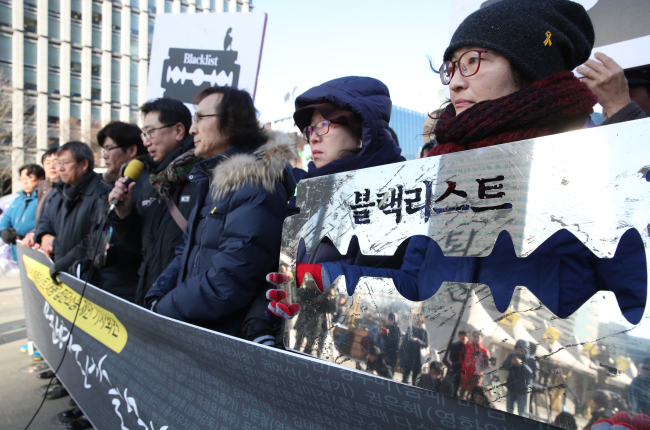A group of cultural figures in Korea on Monday announced it would file a lawsuit against the Park Geun-hye administration for the “blacklist” it kept of anti-government artists.
Comprised of groups including Cultural Action, Lawyers for a Democratic Society (Minbyun) and others in the culture circle, the association for legal action on the blacklist held a press conference to publicly invite fellow artists as plaintiffs in its lawsuit.
“The Park administration abused the inherent disadvantage of the artists -- that we cannot work without government support -- to censor them and deprive those that did not fall in line with financial support,” said Gang Sin-ha, a Minbyun lawyer representing the association.
Anyone whose name is on the list -- which was revealed via local media -- or is deemed likely to have been included on it can participate with a minimum fee of 10,000 won ($8.50). Those who wish to join the lawsuit can do so until 6 p.m. on Jan. 31.
 |
Korean artists hold a press conference concerning their lawsuit against the government at Gwanghwamun Square in Seoul on Monday. / Yonhap |
Artists considered likely to have been included on the blacklist include those who signed a petition related to the Sewol ferry disaster; publicly supported opposition figures, such as former head of the Democratic Party of Korea Moon Jae-in or Seoul Mayor Park Won-soon; publicly supported progressive parties; satirized the president; or pointed out problems related to the government’s culture projects.
“It is imperative for us to legally approach the issue (of the blacklist), find out who is behind it, and make sure they are punished,” said Jeong Se-hoon of the Korean People Artist Federation.
Lee Won-jae of Cultural Action said he expects 300-400 artists to participate, although the goal is to reach 1,000.
The existence of the blacklist was officially confirmed last week by Culture Minister Cho Yun-sun, who denied involvement in drawing it up.
The artists’ group is seeking legal action against Cho and former Blue House Chief of Staff Kim Ki-choon, who is suspected of being the mastermind behind the blacklist.
Last month, Cultural Action filed charges against nine former and current government officials including Kim, Cho and Mo Cheol-min, a former presidential secretary and current Korean ambassador to France.
The president is currently neck-deep in suspicions that she took part in the massive corruption scandal involving her confidante Choi Soon-sil. The two are suspected of having allowed Choi’s associates to meddle in state-funded culture projects for personal gain.
The Culture Ministry is removing traces of Choi and her minions from government policy by scaling down key projects steered by the Park administration including the cultural enrichment policy and Creative Korea, the new nation brand that was launched last year. Both are suspected to have been illegally influenced by Park and Choi’s inner circle.
“The cultural enrichment (project) and the blacklist are like twins. The true nature of the former is the latter,” said Lee Dong-yeon, a Korea National University of Art professor.
Referring to the Yushin Constitution in the 1970s, which allowed the iron-fisted rule of Park’s father -- former President Park Chung-hee -- Lee said the blacklist represents the “return of Yushin and its death would mean the end of Yushin.”
In protest against the blacklist, local artists have set up a “Black Tent” in Gwanghwamun Square, where they are staging plays critical of the government. The first show was to be performed late Monday.
The artists, who have been staying in the tents set up in the square since November, vowed to continue the performances and their protest until Park steps down and Culture Minister Cho is arrested.
By Yoon Min-sik (
minsikyoon@heraldcorp.com)








